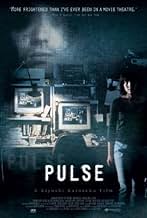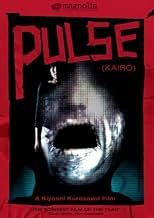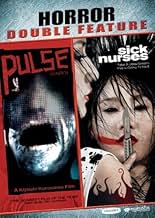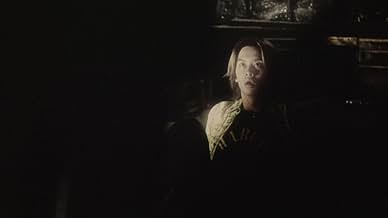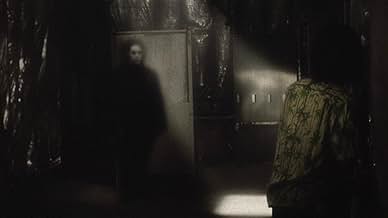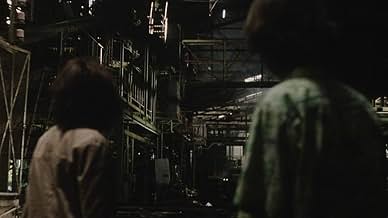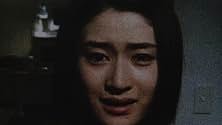Zwei Gruppen von Menschen entdecken Hinweise darauf, dass Geister versuchen könnten, über das Internet in die menschliche Welt einzudringen.Zwei Gruppen von Menschen entdecken Hinweise darauf, dass Geister versuchen könnten, über das Internet in die menschliche Welt einzudringen.Zwei Gruppen von Menschen entdecken Hinweise darauf, dass Geister versuchen könnten, über das Internet in die menschliche Welt einzudringen.
- Auszeichnungen
- 3 Gewinne & 3 Nominierungen insgesamt
Empfohlene Bewertungen
What could have been just another RING rip-off turns out to be one of the most thought-provoking and genuinely eerie films I've seen come out of Japan: it's a film in which the door between the living and the dead is accidentally opened, leading to all manner of sinister events as it transpires that the dead are returning to Earth.
Like most J-horrors of the past decade, PULSE is a slow burner that moves almost glacially, gradually slotting in the various pictures of the jigsaw as its final game plan becomes apparent. Saying too much would spoil the intriguing, dream-like narrative, suffice to say that this is a film that doesn't disappoint at any stage during its progress. The 'ghost' segments are supremely creepy and disturbing, countered neatly by shock suicide scenes and a clever bit of FX involving a plane that was later cribbed for Alex Proyas's Hollywood movie KNOWING.
The cast give typically understated performances that increase in intensity as the character list is gradually whittled down, leading to one heck of a grim climax. Altogether, I can't fault the direction, writing, acting as all three combine to deliver an imaginative and thoughtful ghost story that's extremely different from most of what's come before.
Like most J-horrors of the past decade, PULSE is a slow burner that moves almost glacially, gradually slotting in the various pictures of the jigsaw as its final game plan becomes apparent. Saying too much would spoil the intriguing, dream-like narrative, suffice to say that this is a film that doesn't disappoint at any stage during its progress. The 'ghost' segments are supremely creepy and disturbing, countered neatly by shock suicide scenes and a clever bit of FX involving a plane that was later cribbed for Alex Proyas's Hollywood movie KNOWING.
The cast give typically understated performances that increase in intensity as the character list is gradually whittled down, leading to one heck of a grim climax. Altogether, I can't fault the direction, writing, acting as all three combine to deliver an imaginative and thoughtful ghost story that's extremely different from most of what's come before.
This film works on many levels. What's odd is that one place it is weak in is the plot - it does somewhat tie it all up and make sense but my main point is it doesnt really matter - the director set out to make a scary ghost story and that it is! I see horror films from all over the world so I am pretty jaded when it comes to something "scaring" me but this film has many sequences that truly are frightening and disturbing. Some of the images have stayed with me for weeks. The lighting, the art direction and the use of muted colors (aside from reds used effectively)all make up for a creepy, eerie visual. I have to laugh at the arrogance of some of the comments on this and other "horror" films that claim since it didnt scare them the film is NOT SCARY. That is b.s. What scares one person may not scare another. You can say the piece didn't scare you but to make such a sweeping statement is vain. I personally didn't like any of the Friday of 13th movies, but obviously those films work on some level for millions of people. This film is so non-American in it's pace and core that that is what might turn off some viewers, but that's what I loved about it. The director just sets up the camera and keeps it on a space and then has things slowly emerge from the sides - he has you start to look and scope and wonder if you are REALLY seeing something as opposed to the lazy, bloated SHOCK moment of most US horror films. There are moments when people are confronted by visions/images of ghosts that move and terrorize just like real dreams - slow movements, awkward movements as the ghost approaches you. Terrifying. The film definitely doesn't know how to wrap it all up but in many ways, I found this film even scarier than the original RING. Well made ghost story. Seek it out, fans.
I love Takefumi Haketa's score - sometimes disquieting, sometimes sorrowful, but always lending substantially to the mood in the film. I love the haunting atmosphere that pervades the feature, cemented with scenes of desolation - empty buildings and streets.
I wish I had more concrete praise to offer.
There's a vague theme about not giving in to despair and loneliness, as such surrender is the real killer. This thematic content is stronger than any specific sense of narrative - which seems backwards, but here we are. For as much as the Internet is emphasized in one way or another, it's nothing more than a starting point for the plot. For as much as red tape is emphasized, it doesn't seem to serve any actual function in-universe, and therefore none in the plot. And because a few different ideas seem to be put forth, it's unclear why events transpire in the first place. The netherworld is the embodiment of loneliness, maybe? Ghosts want to pass into the real world from the netherworld - because the real world is inherently not lonely, maybe? Ghosts and humans can't coexist in the same space, maybe? Ghosts want to make friends, maybe?
I can abide narrative that is disordered, weak, minimized, or scarce - but I do generally require narrative of some kind in a movie, or some overarching unifying quality. Unless... is that lingering ambiguity the whole point? Is the lack of clarity about what is happening, or why, the other side of the coin to the looming air in the picture of nervous foreboding?
I've only seen a few other Kiyoshi Kurosawa features, but I greatly enjoyed those that I have. I began watching 'Pulse' with high expectations, and I'm sad to say I'm let down. I don't think it's outright bad, but I want to like it much more than I do. The great atmosphere and music keep the film aloft while deeply indistinct writing prevents it from achieving greater heights. Why, as if to accentuate the very difficulty I'm having - I note two blurbs from critics who, speaking from opposite perspectives, still had the same conclusion. Stephen Hunter, for The Washington Post, wrote a positive review in saying "'Pulse' is best enjoyed if it's not questioned too closely. It lives visually in a way it cannot live intellectually." In a nearly identical remark, Jeff Shannon's critical review for The Seattle Times observed "While it's rattling your nerves, 'Pulse' leaves your brain wanting more."
I don't know anything about ghosts, but 'Pulse' definitely exists in a liminal space between life and death. Or is that uncertainty also wholly intentional?
Obviously many other people have gotten more out of this than I have; I'm glad for them. Perhaps given more time and consideration I'll turn a corner and regard 'Pulse' more highly. As it is, much to my disappointment, I'm just unsatisfied.
I wish I had more concrete praise to offer.
There's a vague theme about not giving in to despair and loneliness, as such surrender is the real killer. This thematic content is stronger than any specific sense of narrative - which seems backwards, but here we are. For as much as the Internet is emphasized in one way or another, it's nothing more than a starting point for the plot. For as much as red tape is emphasized, it doesn't seem to serve any actual function in-universe, and therefore none in the plot. And because a few different ideas seem to be put forth, it's unclear why events transpire in the first place. The netherworld is the embodiment of loneliness, maybe? Ghosts want to pass into the real world from the netherworld - because the real world is inherently not lonely, maybe? Ghosts and humans can't coexist in the same space, maybe? Ghosts want to make friends, maybe?
I can abide narrative that is disordered, weak, minimized, or scarce - but I do generally require narrative of some kind in a movie, or some overarching unifying quality. Unless... is that lingering ambiguity the whole point? Is the lack of clarity about what is happening, or why, the other side of the coin to the looming air in the picture of nervous foreboding?
I've only seen a few other Kiyoshi Kurosawa features, but I greatly enjoyed those that I have. I began watching 'Pulse' with high expectations, and I'm sad to say I'm let down. I don't think it's outright bad, but I want to like it much more than I do. The great atmosphere and music keep the film aloft while deeply indistinct writing prevents it from achieving greater heights. Why, as if to accentuate the very difficulty I'm having - I note two blurbs from critics who, speaking from opposite perspectives, still had the same conclusion. Stephen Hunter, for The Washington Post, wrote a positive review in saying "'Pulse' is best enjoyed if it's not questioned too closely. It lives visually in a way it cannot live intellectually." In a nearly identical remark, Jeff Shannon's critical review for The Seattle Times observed "While it's rattling your nerves, 'Pulse' leaves your brain wanting more."
I don't know anything about ghosts, but 'Pulse' definitely exists in a liminal space between life and death. Or is that uncertainty also wholly intentional?
Obviously many other people have gotten more out of this than I have; I'm glad for them. Perhaps given more time and consideration I'll turn a corner and regard 'Pulse' more highly. As it is, much to my disappointment, I'm just unsatisfied.
I really like the slow and ominous atmosphere of Kairo, especially its depiction of Japan's late 90s and early 2000s aesthetics, including early internet culture and architectural design. The film features some excellent decor shots that enhance its eerie and nostalgic feel.
Fun fact: Kiyoshi Kurosawa, known for his work in horror, actually started his career directing pink films, which are a genre of Japanese softcore adult movies. This diverse background contributed to his unique approach to creating tension and atmosphere in his later works.
I give this film a 6/10 mostly because i love the aesthetics from the early 2000s.
-Concept (Idea Premise, Worldbuilding, Theme) 7.0 -Plot (A,B,C, Writing) 6.0 -Acting 5.8 -Dialogue(Character development, Plot advancement, Natural-sounding, Consistency, Looping(ADR)) 5.6 -Fun 5.2 -Decor (Aesthetic, Graphics VFX, Scenery/Location, Scenes, Shots, Stage Set, Mise en Scène, Directing) 8.2 -Overall 6.3.
Fun fact: Kiyoshi Kurosawa, known for his work in horror, actually started his career directing pink films, which are a genre of Japanese softcore adult movies. This diverse background contributed to his unique approach to creating tension and atmosphere in his later works.
I give this film a 6/10 mostly because i love the aesthetics from the early 2000s.
-Concept (Idea Premise, Worldbuilding, Theme) 7.0 -Plot (A,B,C, Writing) 6.0 -Acting 5.8 -Dialogue(Character development, Plot advancement, Natural-sounding, Consistency, Looping(ADR)) 5.6 -Fun 5.2 -Decor (Aesthetic, Graphics VFX, Scenery/Location, Scenes, Shots, Stage Set, Mise en Scène, Directing) 8.2 -Overall 6.3.
A group of young people in Tokyo begin to experience strange phenomena involving missing co-workers and friends, technological breakdown, and a mysterious website which asks the compelling question, "Do you want to meet a ghost?"
Director Kiyoshi Kurosawa spent years working in the world of "pink" films and direct-to-video movies. He was at this time best known in the west for "Cure" (1997), though it was "Pulse" that would make him an international sensation. Assisting him is cinematographer Junichiro Hayashi, known for two other J-horror modern classics, "Ring" and "Dark Water".
"Pulse" was released at the right time for American audiences to latch on to. The American version of "The Ring" came out in 2002, and sparked a wider interest in Japanese horror, kicking off a wave of remakes. This also helped get the originals a wider distribution in the States -- "Pulse" being among those, as well as "Audition" and many of the Takashi Miike films that had previously been very niche.
Kurosawa uses this film not just to tell a good ghost story, but to explore "the horror of isolation" in a world of increased inter-connectivity. With its dreary, depressing color palette and empty space, we find this story about the Internet to truly be about loneliness. Whether intentional or not, it is a clever social commentary that may be more true today (2017) than it was at the time.
Some early reviews were critical because the film is heavier on style than substance and the narrative is not completely coherent. But since then, praise has only grown. In 2012, Jaime Christley of Slant magazine listed the film as one of the greatest of all time. In the early 2010s, Time Out conducted a poll with several authors, directors, actors and critics who have worked within the horror genre to vote for their top horror films. "Pulse" placed at number 65 on their top 100 list.
The Arrow Video Blu-ray is a fine package and a great excuse to re-visit this film. Contents include (but are not limited to) new interviews with writer/director Kiyoshi Kurosawa (at an astounding 43 minutes!), actor Show Aikawa and cinematographer Junichiro Hayashi (24 minutes); "The Horror of Isolation", a new video appreciation featuring Adam Wingard and Simon Barrett; an archive 'making of' documentary, plus four archive behind-the-scenes featurettes.
Director Kiyoshi Kurosawa spent years working in the world of "pink" films and direct-to-video movies. He was at this time best known in the west for "Cure" (1997), though it was "Pulse" that would make him an international sensation. Assisting him is cinematographer Junichiro Hayashi, known for two other J-horror modern classics, "Ring" and "Dark Water".
"Pulse" was released at the right time for American audiences to latch on to. The American version of "The Ring" came out in 2002, and sparked a wider interest in Japanese horror, kicking off a wave of remakes. This also helped get the originals a wider distribution in the States -- "Pulse" being among those, as well as "Audition" and many of the Takashi Miike films that had previously been very niche.
Kurosawa uses this film not just to tell a good ghost story, but to explore "the horror of isolation" in a world of increased inter-connectivity. With its dreary, depressing color palette and empty space, we find this story about the Internet to truly be about loneliness. Whether intentional or not, it is a clever social commentary that may be more true today (2017) than it was at the time.
Some early reviews were critical because the film is heavier on style than substance and the narrative is not completely coherent. But since then, praise has only grown. In 2012, Jaime Christley of Slant magazine listed the film as one of the greatest of all time. In the early 2010s, Time Out conducted a poll with several authors, directors, actors and critics who have worked within the horror genre to vote for their top horror films. "Pulse" placed at number 65 on their top 100 list.
The Arrow Video Blu-ray is a fine package and a great excuse to re-visit this film. Contents include (but are not limited to) new interviews with writer/director Kiyoshi Kurosawa (at an astounding 43 minutes!), actor Show Aikawa and cinematographer Junichiro Hayashi (24 minutes); "The Horror of Isolation", a new video appreciation featuring Adam Wingard and Simon Barrett; an archive 'making of' documentary, plus four archive behind-the-scenes featurettes.
Wusstest du schon
- WissenswertesTakashi Miike has said that this is the only film that has frightened him as an adult.
- PatzerRyosuke is typing in a numerical password to log in to his computer to watch videos on the dark web as shown on his screen. When it cuts to a shot of him typing on his keyboard however, he is pressing letters instead of numbers.
- Zitate
Ghost: Death was... eternal loneliness.
- Alternative VersionenRemade in America with the same (English) title, starring Kristen Bell, in 2006.
- VerbindungenEdited into Pulse - Du bist tot bevor du stirbst! (2006)
- SoundtracksHane Lay Down My Arms
Performed by Cocco
Top-Auswahl
Melde dich zum Bewerten an und greife auf die Watchlist für personalisierte Empfehlungen zu.
- How long is Pulse?Powered by Alexa
Details
Box Office
- Bruttoertrag in den USA und Kanada
- 51.420 $
- Eröffnungswochenende in den USA und in Kanada
- 7.250 $
- 13. Nov. 2005
- Weltweiter Bruttoertrag
- 319.233 $
Zu dieser Seite beitragen
Bearbeitung vorschlagen oder fehlenden Inhalt hinzufügen








